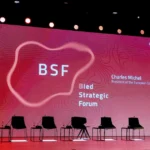“After the Nord Stream sabotage, Hungary and Serbia warned the international community that they would consider any threat to the system of gas delivery from the Russian Federation as grounds for war,” Hungarian Prime Minister Viktor Orbán said in an interview with an American journalist, pro-Russian conservative and political commentator Tucker Carlson. Orbán emphasized that Hungary immediately qualified the act of sabotage at the Nord Stream pipes as as a terrorist act, and branded the lack of a decisive reaction by Germany “a manifestation of a lack of sovereignty.”
It is noteworthy that recently, the topic of blasts at the Nord Stream gas pipes has sprung back into international spotlight. Despite the fact that the investigation is yet to be completed and the ring of those involved has not been established, a number of media outlets are putting forward a premature and rather provocative question whether Germany’s partnership with NATO will be revised in the event that the involvement of another NATO ally is proven.
In his statements, Viktor Orbán went even further: “Together with the prime minister of Serbia and the president, we noted that if someone intends to do with the southern corridor (laid from Russia to Türkiye, Bulgaria, Serbia, and Hungary) the same thing that was done with Nord Stream, we will consider it grounds for war, a terrorist attack, and we will respond immediately.” Without revealing to whom exactly his warning was addressed, although clarifying that it was not Russia, the prime minister of Hungary called for abandoning such plans. “Maybe you can do that with the Germans, but you can’t do that with this region,” he added. Asked by Tucker Carlson why Germany, Europe’s largest NATO ally, didn’t say anything about the U.S. destroying the Nord Stream gas pipe, which Carlson claimed broke the German economy, Orbán said Berlin and the West rejected the version of a terrorist attack.
It is noteworthy that Orbán did not deny the journalist’s words regarding the alleged U.S. involvement in blowing up the gas pipe, despite the fact that this rather serious accusation is not supported by any facts.
Commenting on the Hungarian prime minister’s statement, the former Minister of Foreign Affairs of Serbia, Vladislav Jovanović, noted that “sabotage of the Balkan Stream” (the extension of the Russian Turkish Stream to Bulgaria, Serbia, and Hungary) would entail a permanent crisis and a fatal blow to the Balkans. There is also the question that America and its allies could commit such an act of sabotage.” At the same time, Serbian General Mitar Kovac also claims: “Since the explosion on the Nord Stream, there have been speculations that America has a plan to destroy the Balkan Stream and thus cut off Europe from Russian energy supplies. America does not abandon (the idea of) cutting off the European Union, primarily Western Europe, from the energy supply they receive from Russia in all segments.”
It seems that Viktor Orbán, Vladislav Jovanović, and Mitar Kovac have no doubt that the disruption of the Nord Stream gas flow was orchestrated by the USA. This is the opinion broadcast in their public space. Moreover, the prime minister of Hungary, a NATO ally, is actually threatening the U.S., another NATO ally (and those who prevent Russia from exporting its gas to the region), with war if the southern gas corridor is sabotaged. All this, together with accusations against Germany over an alleged lack of reaction to the incident, which is yet to be fully investigated, bears the signs of a systemic provocation aimed at a sowing a split within the NATO bloc.
Budapest has long ignored recommendations from Brussels to sever Russian gas supplies in order to reduce energy dependence on Moscow. However, baseless threats by a NATO ally and EU member state regarding the readiness to start another war in Europe, only to make sure Russian gas safely makes it to Hungarian territory, sound somewhat rash, to say the least.
Orbán recently stated that he is treated worse in Europe than even Russia. In addition, Hungary is actually seen as a Russian agent of influence in the EU. But in the wake of such statements, Washington and Brussels may conclude that the Kremlin also has a Trojan horse is in NATO ranks. Hungary is a country where horses are historically revered, given that their ancestors, the Huns and Hungarians, were nomads. However, being called out as a Trojan horse is something else, more subtle in the context of betraying European values in favor of Russia’s aggressive policy.
It is important that Azerbaijani gas is shipped to Türkiye, Bulgaria, Serbia, and Hungary in parallel lines. Baku is ready to increase the volume of supplies. This was even mentioned by Hungary’s top diplomat Péter Szijjártó. “We plan to buy increasingly large volumes of gas in Azerbaijan and Türkiye, so we will need Bulgarian transit capacity more and more,” Szijjártó noted during a meeting with Bulgarian President Rumen Radev, who assured him of Bulgaria’s readiness for cooperation. It is noteworthy that Orbán is not afraid of any sabotage on this pipeline.
At the same time, the President of Serbia, Aleksandar Vučić, stated that “Viktor Orbán said this conditionally – the point is that we hope no one will consider denying us what we paid for and bought in the winter. We have no indication that anyone is planning anything like this, and I don’t believe that anyone has any idea that this could happen.”
It is possible that Budapest is deliberately framing Serbian authorities toward making statements they would not like to bring up publicly.



